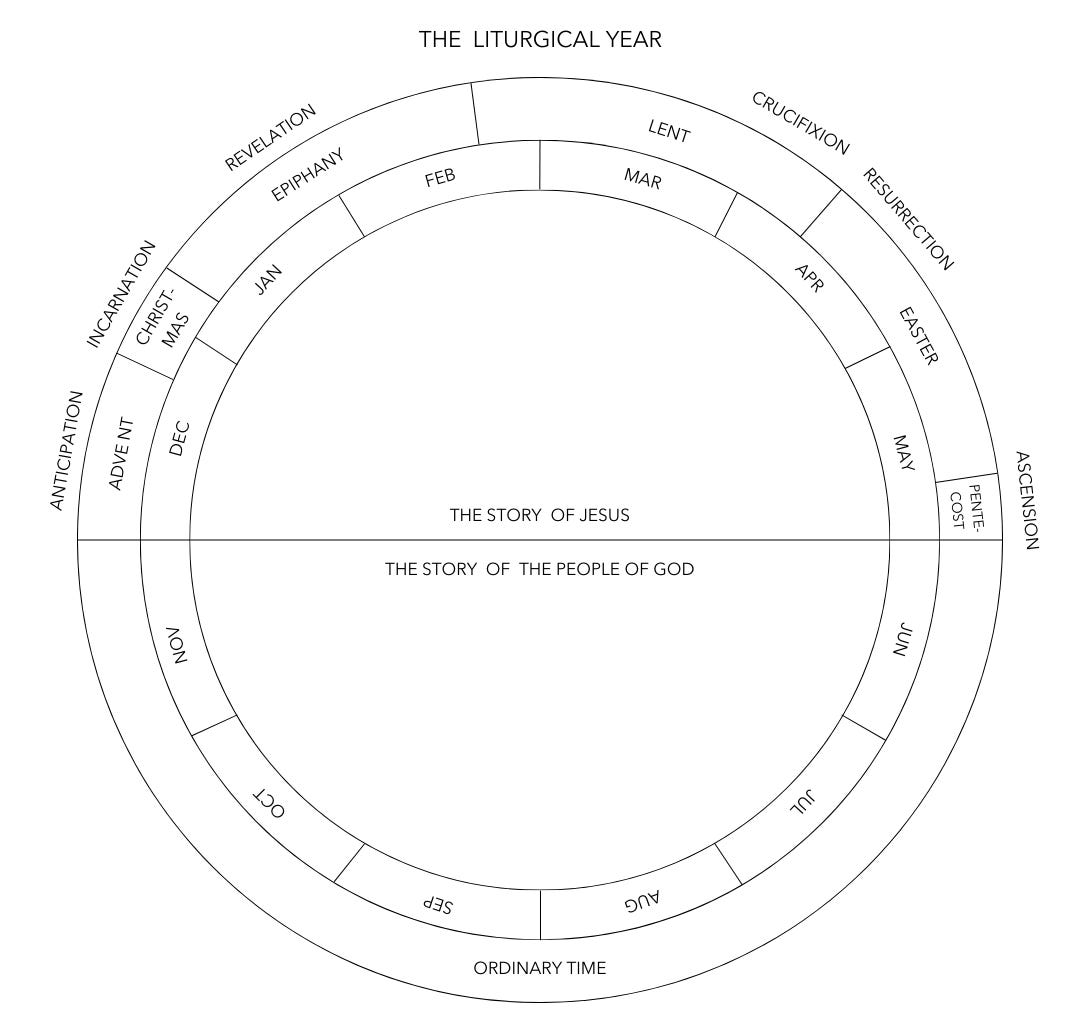Contemplative Practices: Living the Liturgical Year
Inhabiting the story of God in each of our days
There are so many ways we keep time. There are the standard ones: the Gregorian calendar that says I'm writing this post on October 11, 2024; the Julian calendar, though, a solar calendar still used by parts of the Orthodox Church, says I’m writing this on September 28.
We have clocks and watches set to our time zones which are, for the most part, calibrated to the rotation of the earth and the rising and setting of the sun. We’ve set up this standard measurement of keeping time.
We also tell time by the personally measured events of birthdays and anniversaries, graduations, diagnoses, the death of loved ones, and the birth of children. Students and teachers keep time by semesters, and summer and spring breaks.
Our faith also gives us a way to tell time by another measure. It’s an entirely different calendar that invites us to keep time according to the story of God’s salvation in Jesus and the historic rhythms of his church, and the practice of living inside of this time can powerfully form and reform us according to God’s story and the way God is moving. Pastor and author Eugene Peterson writes,
When we submit our lives to what we read in Scripture, we find that we are not being led to see God in our stories but our stories in God's. God is the larger context and plot in which our stories find themselves.
We often think of ourselves as ordinary people accomplishing the unremarkable as we live out our days one after another. We often lose ourselves in the small context of our calendared days. But God has invited us to see ourselves as a part of a much larger story that God’s been telling since the beginning. It’s a story that God will never stop telling, and we have been invited into it.
The Christian calendar, or the liturgical year (illustrated above), is a beautiful way for us to practice the sacred rhythms and inhabit the ever-unfolding story of God and our place in it. In our practice of keeping it, it inhabits and changes us. Every part of the liturgical calendar offers a way for us to pattern our days according to how God has and still is revealing the Divine in the life, death, and resurrection of Jesus.
The contemplative practice of living the Christian year teaches us that none of God’s accomplishments are solely past events which we recall, but present realities upon which God asks us to join in on.
The Invitation of Each Season of the Liturgical Year
Advent
Advent is a time for God to enlarge us as we wait. During this short season in December we’re invited to look back at Christ’s birth and to lean forward into God’s promise of a world made new and right.
Christmas
Throughout the twelve days of Christmas we are invited to give ourselves anew to God’s gift of himself in Jesus. We give generously because God first gave to us generously.
Epiphany
Epiphany is a season of five to nine weeks in which we remind one another of the first stories of Jesus from the gospels, the visit of the Magi, Jesus’ baptism, and his first miracle at the wedding at Cana. Epiphany means “to cause to appear” or “to bring to light.” We celebrate that the heart of God and the desires of the divine are lived out in the words and actions of Jesus.
Lent
The forty-day season of Lent (from the Saxon word length and the Old English word for springtime) is a journey toward the cross and a time to recollect the forty days of Jesus’ temptation in the wilderness. Lent is a season of turning away from self-sufficiency and sin and recalling the many ways we attempt to live life on our own. During Lent, we are invited to rely upon the promises of God rather than the comforts we afford ourselves.
The Paschal Triduum
This is the fancy name given for the three days at the end of Holy Week which includes Maundy Thursday, a day to recollect the last meal Jesus shared with his disciples; Good Friday, a day to remember Jesus’ death on the cross and his burial in a tomb, and to consider our complicity in his dying; and “Silent Saturday,” when we keep rest just as Jesus’ body did on that Sabbath day (remember: the Jewish Sabbath is on Saturday).
Easter and Ascension
The holiest of seasons on the church calendar, Easter is the longest of the festival celebrations, lasting fifty days (-ish). We celebrate that God’s life-giving promise is larger than death and the confines of the grave and that there is no power on earth that’s stronger than what God can do.
Ordinary Time
During ordinary (meaning ordinal or numbered) time, we are called to live out the promises of Jesus’ birth, life, death, and resurrection (every previous season of the liturgical calendar) in our own life. Together, we attend to our call to discipleship and seek to grow into that call.



SO loved this, just as I've loved all the earlier ones. And your caption, inhabiting the story of God in each of our days speaks so strongly to me. This phrase particularly pulled me up short....we find that we are not being led to see God in our stories but our stories in God's!! So very, very true! Thank you!